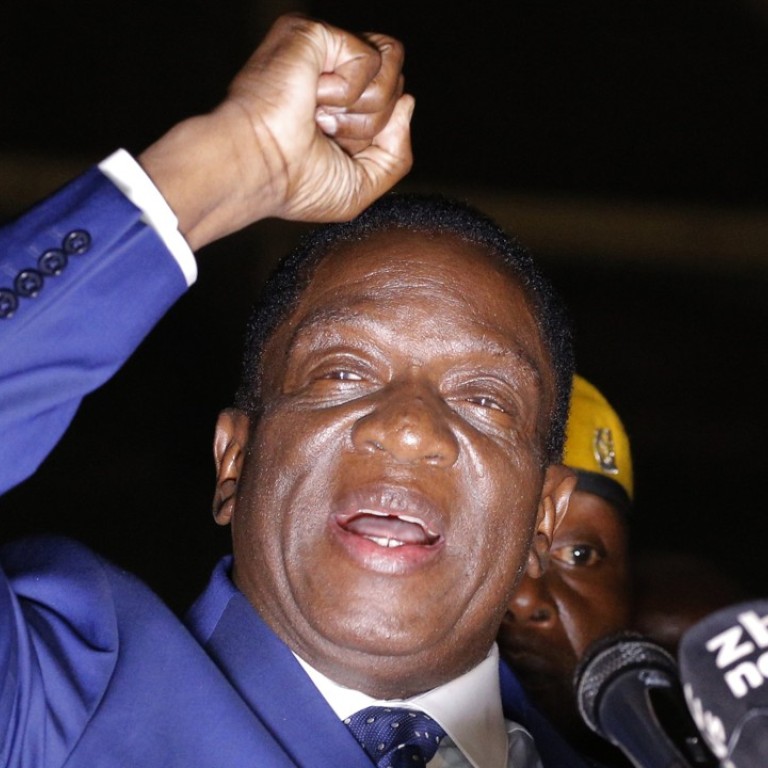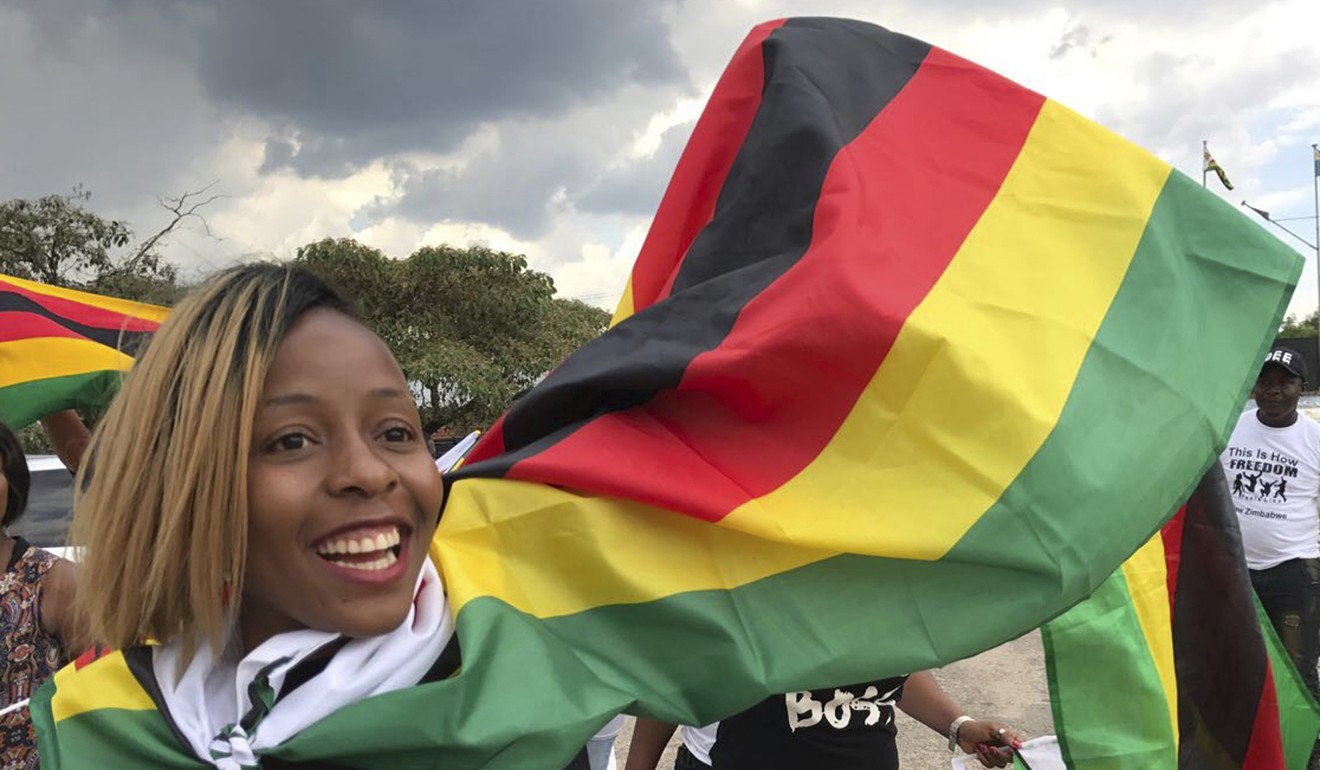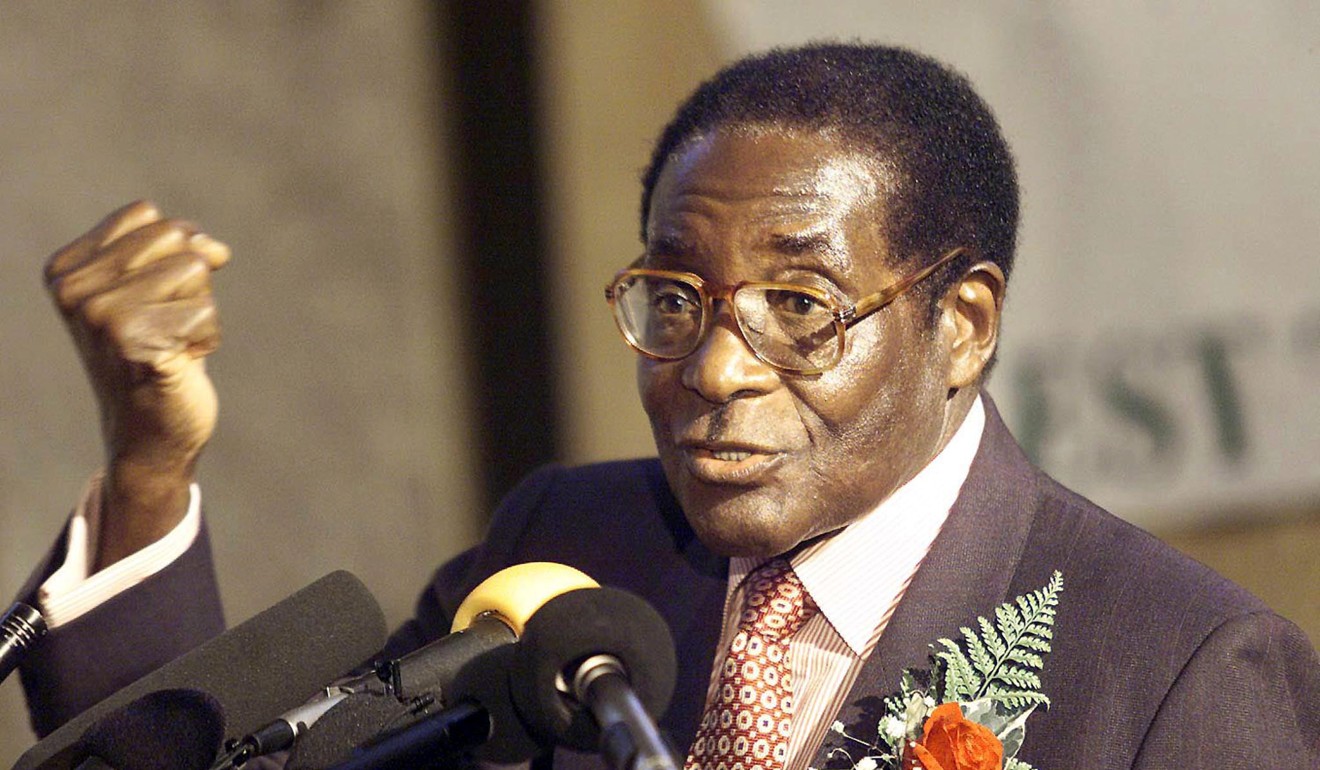
It’s business as usual for China in Africa even as Zimbabwe swaps Mugabe with the ‘crocodile’
Beijing’s interests in Zimbabwe are undoubtedly strong, but its influence under the wily Emmerson Mnangagwa remains to be seen
The anointment of the “crocodile” Emmerson Mnangagwa as Zimbabwe’s new president, has brought sighs of relief both at home and abroad. Whether the joy and new hopes at the fall of 93-year-old Robert Mugabe and his ambitious wife Grace, prove justified will only in time be seen. I suppose we can say with reasonable confidence that for the 16 million ill-served people who call Zimbabwe home, life can hardly get worse.
Watching from afar the dramatic events unfolding over the past two weeks in Harare – a place few of us have spared a thought for over the 37 years of its life as an independent nation – raises three sets of thoughts: first, about the uncomfortable legacies of British colonialism; second about how misrule can reduce a potentially rich country to penury; and third, about China’s increasingly significant role in Africa.
Whatever the power of the British Empire built ruthlessly over two centuries, Britain’s post-colonial legacy has been an embarrassing one wherever in the world you look (let’s hope Hong Kong proves an exception). The institutions built have almost nowhere been fit-for-purpose, and the post-liberation leaders left behind – many of them like Mugabe forged in bloody bush wars for independence – have been inept at best, and brutally tyrannical at worst.

It seems Mugabe falls into the former “inept” category, only occasionally unleashing brutality. For that you have to look to the likes of Idi Amin in Uganda and the post-independence generals in Myanmar. In his early years, Mugabe seemed the kind of radical reformer that a newly independent country needs, building a strong education system and good health care. There were echoes of Castro’s Cuba here.
Even his ruthless ejection of the large rich white Rhodesian farming class was welcomed at home and in African nations nearby. The tragedy there was in the “land grab” execution, rather than the principle, which gave farms to people who knew nothing about farming, and who reduced one of Africa’s most agriculturally fecund economies to poverty and reliance on imported food aid.
As for misrule and tyranny, the same lesson went unlearned wherever nations have had to fight violently for independence: the qualities needed to fight and win an independence war are not the qualities needed for the important but comparatively uncharismatic tasks of good peacetime governance and sound economic management. The former qualities morph too easily into megalomania and tyranny, and pre-empt the necessary transition to the latter.
As Jennifer Cooke at the Washington-based Centre for Strategic and International Studies painfully summarised: “At independence in 1980 Zimbabwe enjoyed a strong, outward-looking economy, education and health systems ranked among the continent’s best, and a highly-skilled and educated cadre of professionals and civil servants.
“The stunning economic collapse that began in the late 1990s, which saw the economy shrink by half and inflation rise into the sextillions – was seen as a self-induced catastrophe, driven by a haphazard redistribution of farmland to Mugabe’s political cronies, massive looting of state coffers, and egregious economic mismanagement.”
Even compared with its neighbours – none of them among the world’s most impressive economic performers – Zimbabwe’s 37 years under Mugabe has been catastrophic. Countries like Kenya, Zambia and even Ethiopia have managed eight- to 12-fold increases in GDP, while Zimbabwe has stagnated.
And is Mnangagwa going to change all this? Whatever the present euphoria pulsing through the streets of Harare, the jury is definitely out. As John Campbell at the Council on Foreign Relations in Washington noted, Mnangagwa and Mugabe are “cut from the same cloth”. The two have fought and ruled alongside each other at the top of the Zanu-PF party for four decades. Mugabe’s atrocities have been Mnangagwa’s atrocities. Mugabe’s economic mismanagement has been Mnangagwa’s. The same army generals have fought for, and alongside, both men. They have distributed wealth among the same cronies. Mnangagwa is a hugely wealthy man. Guess how. There are commentators who say he is clever and technocratic. Let’s see.
While China’s economic footprint in Africa is growing, it represents only a fraction of China’s economic activity around the world
The third set of thoughts, on China’s role, is intriguing. As Zimbabwe’s biggest trade and investment partner, links between the two countries are close and China’s interests in Zimbabwe are undoubtedly strong. It accounts for 26 per cent of Zimbabwe’s exports. But the media image of China as some kind of overwhelming force in Zimbabwe, or indeed in Africa, is something of a mirage.
As David Dollar at the Brookings Institution notes: “Chinese financing [in Africa] is substantial … but the notion that it has provided an overwhelming amount of finance and is buying up the continent is inaccurate.”
It is worth remembering that China’s total trade with the whole of Africa is less than US$180 billion a year – less than half its trade with the US, and just two thirds of its trade with Hong Kong. And Zimbabwe is a trade minnow compared with countries like Nigeria, South Africa, Kenya, Congo, or China’s second largest source of oil – Angola. They are embraced by Xi Jinping’s Belt and Road vision, but modestly at its margins.
Yun Sun, also at Brookings, notes: “While China’s economic footprint in Africa is growing, it represents only a fraction of China’s economic activity around the world. Considering the low priority of Africa in China’s overall foreign strategic mapping, a disproportionate level of international attention, publicity, and scrutiny is paid to China’s Africa engagement.”
Perhaps most important, no matter what the suspicions of Western powers like the US towards China’s rising economic power and strategic ambitions, African attitudes towards China tend to be favourable. US opinion polls last year showed almost two thirds of Africans were “somewhat or very” positive towards China.
Over the past decades, during which China was forced to take whatever friends it could get, African nations had become relatively strong friends. As former Senegalese President Abdoulaye Wade said recently: “China, which has fought its own battles to modernise, has a much greater sense of the personal urgency of development in Africa than many Western nations.”
But there is nothing wide-eyed about this. Sanusi Lamido Sanusi, former governor of Nigeria’s central bank, was in good African company when he said: “Africa must recognise that China – like the US, Russia, Britain, Brazil and the rest – is in Africa not for African interests but its own.”
Zimbabwe’s Mnangagwa will do well to remember this. He has much to prove to the world, and will face deep suspicion. China will be no different from others in cautiously watching and waiting.
David Dodwell researches and writes about global, regional and Hong Kong challenges from a Hong Kong point of view


